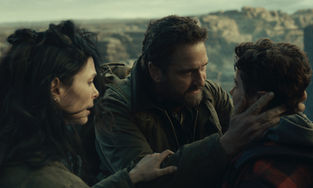'The Quiet Girl' Review: A Little Kid Tries To Find Her Voice In This Lovely Adaptation | HIFF 2022
- S.J.

- Oct 1, 2022
- 2 min read
Updated: Oct 28, 2023

Shh! No talking, eating earth-shattering chips or phones allowed because you might be missing some beautiful cinema and very softly delivered dialogue in the coming-of-age drama The Quiet Girl (An Cailín Ciúin in Irish), and also because that is just bare minimum that is asked of you anyway. Colm Bairéad directs and writes the film, which is his first narrative feature, adapting Claire Keegan's novel 'Foster' in the process. The title refers to nine-year-old Cáit (Catherine Clinch), who's both having trouble at home with her parents as they struggle financially and emotionally raising several kids, and in general since she's shy, quiet and socially awkward. Her parents end up sending her to an unfamiliar cousin's farm for a summer, where she begins to slowly develop her own identity as the couple, Eibhlín (Carrie Crowley) and Seán (Andrew Bennett), actually pay attention to her.
You can often see with these types of films the relentless effort to add some elements that are meant to make them more ''exciting'', such as narration or exaggerated sense of danger. What's actually wonderful about Bairéad's writing, complimentary camera work and lighting is that the vision here is intimate, realistic and calm, which fits the characters it is representing. There aren't many shots that don't feature Clinch's Cáit and the young actor clearly has a bright future ahead if that is desired. She delivers every emotional beat flawlessly, which often has to be done silently with this character, making it even more impressive.
Similarly outstanding is work from Crowley whose character's fears, concerns and trustworthiness is easily available for viewers to connect with, especially in scenes with Bennett's Seán where the couple's push-and-pull is necessary to understand so the final scenes will impact you even more.
The Quiet Girl is also a great character study on the page since intentionally or not, there's notable confidence in that story as Bairéad doesn't fall back on easy tricks such as telling about time that has passed. We can instantly recognise where Cáit—as well as Eibhlín and Seán later—start and how their relationships and self-image begin to change. ''All you needed was some minding'', Eibhlín states at one point casually, underscoring the themes in the film. And speaking of underscoring, composer Stephen Rennicks also contributes to that notion with his equally soft, flowing music that then almost disappears in short moments where Cáit faces some resistance and reverts back to silence. This is a film about growth, finding your voice and paying attention, so if you as a viewer pay attention to those things, the ending will make your heart burst in all the right ways.
Smileys: Carrie Crowley, screenplay, characterisation, Catherine Clinch, score
Frowneys: Nothing too bad
To be stable, you need to clean your stable.










